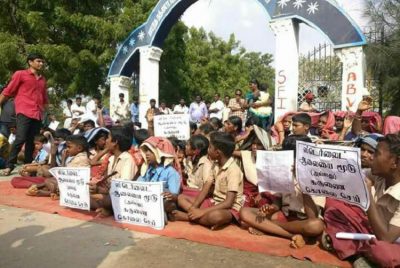
A controversial British-owned copper smelting plant in the southern Indian state of Tamil Nadu was shut down by the local government just days after 13 people were killed by police during protests against the facility. Local people had been protesting and calling for the closure of the factory for 99 days before violence ensued on May 22nd, the 100th day of their action.
In a statement, the company said: “Closure of Sterlite Copper plant is an unfortunate development, especially since, we have operated the plant for over 22 years in most transparent and sustainable way, contributing to the Tuticorin and state’s socio-economic development.” Sterlite Copper is owned by the Vedanta Group.
But, the Sterlite Copper plant has a chequered history and is blamed for unnaturally high cancer rates in surrounding villages. According to The Guardian1: “One resident, Nisha Valdaras, said she knew of at least three people who had died of cancer before they turned 18. “When you go to the doctor, the first thing they ask is: are you from Tuticorin?”
A 2008 study into the health effects of the plant, by the Department of Community Medicine at Tirunelveli Medical College, found higher than expected incidences of asthma and other respiratory conditions while the iron level in nearby groundwater was up to 20 times higher than acceptable limits.2 Its findings are particularly disturbing since the study was performed at a time when the Sterlite facility was running at less than half its later production levels.
Previously, the state had repeatedly shut down the plant due to pollution complaints and Vedanta was fined £10m in 2013 for breaching environmental standards and operating without the consent of environmental authorities.
Prior to the plant’s closure, four of the five organisations representing Bhopal Disaster survivors released a statement pointing out disturbing parallels between the situation in Tuthukudi and events surrounding the Bhopal Disaster, while demanding immediate closure of the plant:
Demanding immediate closure of the Sterlite factory in Toothukudi, survivors of the Union Carbide disaster in Bhopal today condemned the unholy nexus between the Vedanta Sterlite company and the Tamil Nadu government for the death of more than a dozen victims of pollution yesterday.
Said Rashida Bee President of the Bhopal Gas Peedit Mahila Stationery Karmchari Sangh,”The nexus between Vedanta Sterlite and the Tamil Nadu government is as old, as blatant and as murderous as in the case of the Bhopal Gas disaster. Just as in Bhopal the people of Toothukudi have been protesting against the company for last 25 years and the governments at the state and the centre have been protecting the interests of Sterlite for all these years.”
Nawab Khan of the Bhopal Gas Peedit Mahila Purush Sangharsh Morcha said” Just as in Bhopal poisonous contaminants were detected in the groundwater near the factory many years back and just as in Bhopal the Nagpur based government scientific agency NEERI falsified scientific data to downplay the impact of contamination.”
“Just as in Bhopal, the state pollution control board has been in cahoots with the Polluting company and the government continues to ignore overwhelming and clear evidence of contamination” said Rachna Dhingra of the Bhopal Group for Information and Action.
Sarita Malaviya of Children against Dow-Carbide said “We are in solidarity with our fellow victims of corporate crime in Thoothukudi and join them in demanding immediate closure of Vedanta Sterlite’s copper smelting plant.”
1: The Guardian. Indian copper plant shut down days after deadly protests.
2: The News Minute. Sterlite – here’s the proof: How the copper plant impacts health of Thoothukudi people.
Other Reading: Quartz India. Protests, miscarriages, deaths: Sterlite Copper’s 20 years in Thoothukudi


